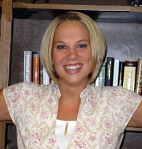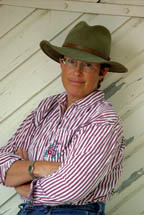Spring/Summer 2004, Volume 21.3
Conversation
Sarah Vause
Speaking of Women: A Short Conversation with Carolyn Dufurrena

Born and raised in Ogden, Utah, Sarah Vause graduated with honors from Weber State University with a bachelor's degree in English. She served a full-time mission for the Church of Jesus Christ of Latter-day Saints in Ireland. Currently, she is an editorial fellow at Western American Literature and a candidate for a master's degree in American Studies at Utah State University. She enjoys traveling, reading, hiking in the foothills around her home, and spending time with her friends and family.

Carolyn Dufurrena began her career in the Great Basin as a geologist. She received her B.A. from Wellesley College and continued her studies at the Univesity of Texas at Austin, receiving her Master's in Geological Sciences. She worked as a minerals exploration geologist for a major oil company for three years in the West. On a mapping project in remote northwestern Nevada, she fell in love with the desert and with rancher Tim Dufurrena, who later became her husband. After several years in the booming oil fields of West Texas, they returned to the family ranch near Quinn River Crossing. Working as a rancher led her to write the compelling essays and texts that accompany the powerful photography of her mother-in-law, Linda Dufurrena, in the acclaimed Fifty Miles from Home: Riding the Long Circle on a Nevada Family Ranch, published by University of Nevada Press (2002), which earned her the Silver Pen Award, given by the Nevada Writers Hall of Fame. She also co-authored Sharing Fencelines: Three Friends Write from Nevada's Sagebrush Corner, a collection of personal essays about the importance of connection to the land and to the people who live in it, which was published by the University of Utah Press (2002). In addition to ranching and writing, she has been an educator in remote rural schools in Humboldt County for 15 years. She currently teaches grades 3 through 8 at a two-room school in Denio, Nevada, 25 miles from her home at Quinn River Ranch. Dufurrena's insights regarding the male dominated world of the ranching industry as well as the traditional role of the cowboy are brought into a female perspective by the examination of her personal evolution reflected in her poetry. I met Carolyn Dufurrena at the Cowboy Poetry Gathering in Elko, Nevada, 2004. Thanks to Carolyn for sharing her insights.
Check out Carolyn Dufurrena's essay and poetry also published in this issue of Weber Studies.
Is the term "cowboy" correct when referring to women also?
Actually, in this part of the world, the Great Basin, the term is "buckaroo," the Anglicization of the Spanish vaquero. So I suppose one would have to consider the term "buckarette," which I have heard used in some contexts, mostly humorous. The term "cowboy" is so overused it's become almost meaningless: "Cowboy up!" or "He's such a Cowboy!" The negative connotations are not as offensive as the Marlboro Man, or the Chevy guy roping with his kid so you'll buy a pickup truck. How do you know you're talking to a cowboy, whether male or female? Not by the boots or the hat. My husband, who's been a buckaroo all his life, never wears his boots to town. The last time he went to the Cowboy Poetry Gathering in Elko some woman from back East tried to buy his hat, and he swore if he ever went back he was going in a seersucker suit. People have fallen so in love with the Cowboy Myth that they don't realize what it's like to be the object of that mythology. We do employ two "bovine technologists" at the moment, one male and one female.
Once again, women who "ride for the brand," shall we say, are largely under the radar. The work defines the word.
How does your poetry define you as a cowboy? Or does it?
My writing is not Cowboy Poetry in the traditional sense, but it grows right up out of this life. Our individual responses to work, to the spiritual grandeur, the physical harshness and small kindnesses of the natural world are what we respond to in our writing. I write about my family, about the courage of our working animals, about the funny things that happen. All these threads grow into the skein of stories that make the day's load lighter.
What is family tradition like in a life that is focused on ranching and cowboying?
We are part of a multigenerational family ranching operation, which is kind of like having Christmas and birthdays with your corporate business partners. It's complicated and funny and warm and infuriating sometimes. We take care of each other, and we try to make sure each individual has the opportunity to make a place for himself, or herself, in this life—if that's what they choose to do. The kids learn to work young, doing real work that's truly important to the economic survival of the family. I believe they learn a strength and confidence in themselves early on that most of our young people never discover in America today. Whether it's just learning how to drive a feed truck by the time you're eight, a tractor when you're ten, gather a piece of country alone with your dog when you're fourteen, our kids become self-reliant and responsible. You can trust them with anything. Well, almost. (Laughter)
What are some of the environmental issues that surround Winnemucca, Nevada, where you reside? Does your poetry help to confront these issues?
We are the watchers and guardians of our open spaces. We see over time what's been good for the land and what's bad for it. We see what misguided government policies in the past have done in the name of overprotection, or what focus on one particular species has done, rather than seeing the whole place as a living, breathing, disturbance-driven system. There's an extended essay called "Desert River" in Sharing Fencelines: Three Friends Write From Nevada's Sagebrush Corner that talks about my work on the BLM Sierra Front Resource Advisory Council in the '90s, trying to bring the perspective of those who live on the land to the larger consensus group. We wrote standards and guidelines for livestock grazing during the Clinton administration. It wasn't pretty. But it's work that needs doing. One of the problems with living on the land is that, by definition, you're out of the urban lifestyle, but the rural life still needs a spokesperson who can communicate what's really going on out here, not the mythologized "Evil Rancher" of some environmental groups (as wrong as the Cowboy Myth I spoke about above). That's one reason I started to write, and that's really what defines my work—explaining the life out here as I see it, right now.
Our big issue will always be water. The bigger the cities get, the more water they'll need. The water grab from the ranches and farms necessitates demonizing the people who live out here. Whether that demonization takes the form of "Millionaire Cowboy" or "Welfare Rancher," the goal is the same. So I just try to show what life is really like for us, and hope somebody out there is listening.
As a woman, do you have to do things differently, or are you accepted as "just one of the
cowboys"?
If you can do the work, it doesn't matter. The best compliment I ever got from a cowboy (or anybody, for that matter) was three little words, "You're good help."
In your opinion, what is a cowboy?
Somebody who gets the work done.
Why is Cowboy Poetry important, and what does the gathering in Elko do to support that genre of poetry?
Cowboy Poetry has evolved to a place where we can discover and appreciate the range of writing that's being done in the West today. It's not necessarily what you'd think of at first—there's a lot more prose read now, and a lot more free verse. It's a growing venue for authors and for people who want to hear the new work coming out of the West. The Gathering gets the word out about what's happening in rural America, and I don't know how else a person would ever hear from the tiny fraction of humans who still live out here in the middle of nowhere.
What writers have influenced your writing, whether cowboy, classical, or contemporary?
There's a collection of poems edited by Teresa Jordan called Graining the Mare: the Poetry of Ranch Women that's really wonderful. It made me realize someone might want to read what I had to say, too.
I love the clean prose of Lillian Hellmann, Joan Didion. Isak Dinesen and Laurens van der Post wrote about Africa with the same passion I feel for our West. Edward Abbey was one of the writers who brought me west in the first place. But the woman who was the real pioneer for me in terms of throwing off the trappings of society and wandering the West for the sheer joy of it was Mary Austin. Nearly a century ago she wrote about Nevada and California. She was very politically aware and had sharply defined ideas about how the lands of the West should be best cared for. She fought hard for the idea that all land is sacred, that if one part is set aside as "better than the rest"—as Wilderness Area, National Park, whatever—it gives license to destroy what's left. Ultimately she lost that battle to John Muir, but it's a battle worth reading about.
What role does literature play in your desire to write? What makes you want to write?
We are all conduits for the ideas that are flying free around the universe. Writing is my way of bringing them down out of that realm of imagination so other people can share. It's a big world out there and in there—inside your head. The internal landscape is as complicated and disturbance-driven as the exterior. Making sense of it all is what drives me, I guess.
What book has most influenced you as an author?
That's hard to choose. Edward Abbey's Desert Solitaire was a powerful influence on me in my twenties, but as I grow older I am drawn to the writing of women who have had the imagination and the courage to make their own way in the world, and who can balance love and work in their lives. Gretel Ehrlich's The Solace of Open Spaces, for example, tells a great story of how one woman heals, alone in the Wyoming desert, after the loss of her great love. (I also admire her for being struck by lightning twice, and surviving.) I love writers with a sense of humor, without which we are all lost. I admire Louise Erdrich. The way she develops characters and their relationships through her series of Native American novels is at once hilarious and heart-wrenching. But the poets, in the end, say it all with so few words. These, from "Epitaph" by Margot Liberty in Graining the Mare:
She never shook the stars from their appointed courses,
But she loved good men,
And she rode good horses.
